| 25th December | | |
London Underground ban Paddy Powers advert
| From the Guardian
|
London Underground has banned an ad campaign by bookmaker Paddy Power that features a man who appears to be breastfeeding a baby.
The poster ad has been banned by LU operator Transport for London's compliance committee.
A spokesman for
Paddy Power said that the poster, which uses the strapline Where have all the women gone? , was banned on the grounds that it had the "potential to offend public decency".
The Irish bookmaker said: We are completely astonished
by the reaction of the London Underground to our advert. Fun is central to the Paddy Power brand and we strive to communicate this in all of our advertising.
|
| 21st December | | |
Russian nutters object to coke adverts featuring churches
| From the BBC see
full article
|
Prosecutors in Russia say they are studying a complaint accusing Coca-Cola of insulting Orthodox Christian beliefs in an advertising campaign.
They say the complaint was lodged by 440 residents of the Russian city of Nizhny Novgorod earlier this
month.
It accuses Coca-Cola of blasphemy through using adverts with images of Orthodox churches and crosses, some of which were even put upside down.
" Coca-Cola uses all these Orthodox symbols in a blasphemous way by
placing images of Coca-Cola bottles inside the pictures," the complaint said: Some images are deliberately turned upside down, including the crosses .
Coca-Cola officials have defended the company's marketing approach, saying it
was promoting Russia's cultural heritage.
|
| 11th December | | |
Complaints that a 'couple of puppies' degrades women
| From the Guardian
|
The advertising regulator is considering investigating Des Lynam's Setanta Claus TV ad after complaints that it degrades women by referring to breasts as "puppies".
Setanta's ad features Des Lynam dressed in a yellow Santa suit
in a grotto, while his scantily clad helper "Tinseltoes" flashes a large amount of cleavage.
This prompts a male visitor to the Setanta grotto to grin, stare and absentmindedly mention a "couple of puppies".
The
Advertising Standards Authority has received 23 complaints about the TV ad and is considering launching an investigation to see if it breaks the advertising standards code.
Complainants have objected that the ad is offensive and degrading to
women because of the use of the word "puppies" as a reference to breasts. Others argued that the ad is sexist, objectifies women and is running at inappropriate times of the day for such content to be shown.
|
| 11th December | | |
Christianity is limited to 3 wise men...ever
| From Reuters see
full article
|
An angry Italian priest has persuaded soft drinks company Red Bull to withdraw an advertisement setting its product in a nativity scene on the grounds it is disrespectful to Christianity.
Father Marco Damanti, from Sicily, wrote to the makers of
the drink denouncing their commercial as "a blasphemous act" and said he had received a prompt reply promising to remove it from Italian television.
The advert depicted four wise men, instead of three, visiting Mary and the Baby Jesus
in Bethlehem. The fourth wise man bore a carton of Red Bull.
The image of the sacred family has been represented in a sacrilegious way, Father Damanti told Corriere della Sera. Whatever the ironic intentions of Red Bull, the advert
pokes fun at the nativity, and at Christian sensitivity.
The priest also objected to the company's slogan, "Red Bull gives you wings", said by angels in the animated advert.
|
| 10th December | |
| TV restrictions for alcohol adverts
| From Brand Republic see full article
|
The Children's secretary Ed Balls is poised call for a 9pm watershed for drinks advertising.
The move will be seen as the strongest indication yet that the Government intends to push through the restrictive measure.
Balls is understood to
have been influenced by a report by Alcohol Concern that claims there is a spike in alcohol ads between 3pm and 5pm. According to insiders, he has briefed national Sunday newspaper political editors in a bid to get maximum coverage of his views on
the subject.
The drinks industry has maintained that a 9pm watershed is an unnecessary measure as the scheduling rules around already prevents them appearing during or around children's programmes. They cannot be shown at other times if the
percentage of child viewers rises to 20% above the proportion of children in the general population.
|
| 6th December | | |
Film advert banned over bin Laden joke
| From Contact Music |
Provocative radio ads for Uwe Boll's new horror film Postal have been banned by stations in his native Germany - because he jokes profits from the movie will help to fund Osama Bin Laden's terrorism plans. Radio bosses are afraid that
listeners will take the satirical promotions in a literal context. In one commercial an actor parodies Bin Laden and informs the audience that 5% of the box-office receipts will be used to support Al-Qaeda. But angry Boll has lashed out at the
radio executives, alleging they think listeners are dumb. He rages, No German would be so naive and stupid as to believe that Bin Laden is talking in German via a German radio station. "This is a huge scandal and definitely the wrong signal as
this self-censorship only helps these religious fanatics gain control. Tolerance as well as art, freedom of speech and freedom of expression has always been one of the strong pillars of strong democracies.
|
| 30th November | |
|
| Newspapers produce guidelines for small ads
| From Press Gazette
|
Milton Newspapers are working with the government to help tackle the problem of human trafficking for the sex industry - with a focus being put on the small ads which appear in the local and regional press.
The move follows a meeting between
ministers and newspaper and advertising industry representatives.
The meeting between the government and news and advertising industries, chairman by Home Office Minister Vernon Coaker, included Ms Harman, Margaret Hodge, Hodge, a junior minister
at the Department for Culture, Media and Sport, Solicitor General Vera Baird, Newspaper Society Director David Newell, Christopher Graham from the Advertising Standards Authority, Baroness Buscombe of the Advertising Association and Roger Wisbey of the
Committee of Advertising Practice.
Coaker said after the meeting, on November 1: We agreed a number of important steps today, and will continue to work together. The Government will continue to work with the Police and Local Authorities, and
the Newspaper Society has committed to strengthen its guidance to local papers on what adverts to accept, and to raise awareness of this link to trafficking.
Guidance issued by the Newspaper Society points out that while prostitution itself
is not a criminal offence, brothels and other venues where sexual services are offered are illegal.
It says that the Sexual Offences Act 2003 created offences of causing or inciting prostitution for gain(S52) and controlling prostitution for gain
(S53), and adds: Advertisements offering such services or requesting such service providers, should not be accepted if the publisher knows or has reason to believe that such activities are taking place.
On the issue of advertisements for
massage services, the guidance says: When deciding policies on the acceptance of massage advertisements publishers are advised to bear in mind the following points:
- Massage advertisements can disguise services of a sexual nature. Publishers could be acting unlawfully if they publish an advertisement in the clear knowledge that it offers sexual services. To avoid any question of such
knowledge, publishers should be wary of advertisements which could be construed in a compromising way. For example, obvious phrases such as 'Let me take you to heaven' should be avoided.
- Publishers may
wish to adopt a policy of only accepting massage advertisements from advertisers with the appropriate qualifications.
- Bona fides checks can be made to ascertain the legitimacy of such services.
|
| 28th November | | |
| Another MP joins in on newspaper small ads
| More attempts to correlate between foreign sex workers and the nearly mythical trafficking problem From Rye and Battle Observer
|
Milton Keynes MP, Phyllis Starkey, told the House of Commons notices were appearing in local newspapers advertising women from around the world. She said: Just this week my local newspapers, MK News and the Milton Keynes Citizen, described 'Thai
ladies and new Japanese and Chinese girls weekly'. It is difficult to see how any of those could be legally working in this country.
She asked for assurances that the police would follow up such adverts and check for evidence of vulnerable
women being trafficked in the UK and forced into prostitution. Home Office Minister Vernon Coaker said he had already met with the Newspaper Society to see what more could be done.
|
| 23rd November | | |
| Pandering to easily offended c-words
| From the Guardian
|
Renault has pulled an ad campaign that used the phrase "N-word" over fears it may cause offence.
Renault has moved to pull the press ad, which used the phrase For 10 days, we can't use the 'N' word , despite the fact the
Advertising Standards Authority has yet to decide whether the ad warrants an investigation.
However, the watchdog has already received a number of complaints. The general crux of the complaints is that the ad is offensive, inappropriate and in
bad taste because of the connotations of the N-word, said an ASA spokesman.
The ad, designed to promote a limited-period promotion where Renault dealers were supposedly not allowed to say "no" to customers, is one of three press ads
and three radio spots.
A spokesman for Renault UK said: Any misunderstanding of the N-word is totally unintentional. However, this specific print advertisement will be removed with immediate effect, so as not to cause any offence.
|
| 21st November | | |
ASA gunning for Shoot 'Em Up film posters
| From the BBC see
full article
|
The Advertising Standards Authority (ASA) said adverts for the film Shoot 'Em Up , which received 55 complaints, could be seen to glamorise violence.
One poster shows actor Clive Owen leaping and with guns in both hands pointing
towards the viewer.
In a second poster, actor Paul Giamatti was shown holding a gun and a mobile phone with the line: Just another family man making a living.
Entertainment Film Distributors Ltd disagreed with the complaints,
saying Owen's guns were angled away from the viewer.
The distributor added that the poster featuring Owen had been approved by the Advertising Viewing Committee of the Film Distribution Association.
However, the ASA said the actor's
expression was aggressive, and the posters could be seen to condone violence. It ordered that the two posters should not be displayed again.
|
| 17th November | | |
Brits prove to be a stereotypical nation of whingers
| From the BBC see
full article
|
A series of tongue-in-cheek adverts for Eurostar depicting stereotypical images of British life have prompted complaints that they are offensive.
The images, promoting services to Brussels, have gone up on hoardings and posters in four Belgian
cities.
One which shows a half-naked skinhead relieving himself in a teacup, received five complaints from British people in Belgium, a Eurostar spokeswoman said.
She said the firm had apologised to them, but the adverts would remain.
The spokeswoman for Eurostar said the campaign had become popular and was specifically for Belgium. In a statement Eurostar said: They've [Belgian people] been trying to get hold of copies of the posters and have sent in emails and letters of
congratulation on how successful the campaign is. For those few who have complained we are sending them a personal letter apologising if we caused offence and explaining the thinking behind the creative and the use of humour.
|
| 1st November | | |
ASA to investigate violence in advertising
| From GamesIndustry.biz
see also Economist article:
Indecent Proposals
|
The Advertising Standards Authority has announced that it will be launching an investigation into the use of violence in advertising, in what is being seen as a move in anticipation of the results of the Byron Report.
The ASA also claims that the
report is in response to an increasing number of complaints over time about violence and aggression in advertising, according to an article in Marketing Week.
The report will look at the ASA's past judgements, with a debate launched by chairman
Lord Chris Smith on how violent imagery should be used in advertising, and how children should be protected from harmful or offensive ads.
|
| 29th October | |
| Harriet Harman tries to get escort small ads banned
| No doubt politicians would get stroppy if we labelled them all as corrupt because of a few. Yet they have now embarked on a policy of labelling all working
girls as 'trafficked' when in fact the vast majority are working totally consensually. From the BBC see
full article
|
The Minister for Women Harriet Harman is to discuss banning adverts for escort services with the Newspaper Society.
Harman linked advertisements in some local titles with human trafficking. She said: The Newspaper Society and us need to
sit down together and discuss whether this is acceptable in local newspapers, that girls are for sale.
Harman said the "ugly" adverts were published in some local newspapers and added: You see 'girls for sale - girls from Europe,
from Africa, from Thailand, fresh girls every week, 18 to 25.
What sort of message does this send in the 21st century? We do know that there is a big problem of people trafficking."
|
| 24th October | |
| Italy bans "No Anorexia" advert
| From the BBC see
full article
|
Italy's advertising watchdog has banned an ad campaign for a fashion label showing a naked anorexic woman, saying it breached its code of conduct.
The image, bearing the words "No Anorexia", was first displayed during Milan Fashion Week
in September. It was shot by controversial Italian photographer Oliviero Toscani, who called the ban "censorship" and said he was considering legal action.
The image showing anorexic French actress Isabelle Caro, for Italian fashion
label Nolita, was published in newspapers and featured on billboards during fashion week. Most of the billboards have already been removed, but one remains in Rome.
The Publicity Control Institute (IAP) ruled that the image "commercially
exploited" the illness and breached articles 1 and 10 of its code of conduct.
Article one states that advertising must be honest, truthful and accurate. It must avoid anything that could discredit it. Article 10 states that
advertising must not offend moral, civic and religious beliefs and must respect human dignity in all its forms and expressions.
Last month, France's advertising watchdog, the Advertising Verification Bureau (BVP) also ruled that the
image breached its code of conduct.
During Milan fashion week, Italian health minister Livia Turco backed the billboard, saying it could "promote responsibility towards the problem of anorexia".
|
| 7th October | | |
Glasgow objects to taxi advertising for Agent Provocateur
| From The Herald
See also
Female focused sex shops
|
 A taxi advert featuring "provocative" drawings of ladies' lingerie - and the slogan: Knickers to Glasgow
- has been banned from the city's cabs. A taxi advert featuring "provocative" drawings of ladies' lingerie - and the slogan: Knickers to Glasgow
- has been banned from the city's cabs.
Reasons cited for refusing permission for the advert, for upmarket underwear firm Agent Provocateur, ranged from what you would tell "the grandweans" if they asked for an explanation to the
potential damage to Glasgow's 2014 Commonwealth Games bid.
One councillor said while the advert might be all right for Paris, "this is Glasgow".
But leading women's rights campaigners lampooned the decision, describing the
wording in the advert as little more than Blue Peter humour and claiming local authorities should concern themselves more with the bigger picture of dwindling funds for tackling violence against women.
At yesterday's Licensing Committee meeting
there was virtual unanimity that the advert, which would have covered a cab with images of corsets, whips, g-strings, bras, masks and leather boots, would be likely to offend.
The London-based lingerie firm has 28 days to appeal against the
decision.
A spokeswoman said: We would never put out an advert which we felt was offensive to public taste. The licensing laws in Glasgow must be incredibly strict.
|
| 26th September | | |
ASA find against advert where husband is slapped for leaving toilet seat up
| From the Daily Mail
|
 A
television advert that 'trivialised' domestic violence has been banned after complaints from viewers. A
television advert that 'trivialised' domestic violence has been banned after complaints from viewers.
The commercial for MFI shows a couple rowing after the man leaves a toilet seat up. The woman yells, You've done it again, haven't you? before slapping him twice.
It then emerged the scene took place in an MFI showroom, along with a voice-over, saying: When your bathroom's designed by MFI you'll feel right at home.
It breached seven advertising guidelines and should never have been
broadcast, according to the Advertising Standards Authority (ASA). It was one of a group of five TV adverts for the furniture chain that prompted 217 complaints to the ASA.
The ASA said: Several found the ads distressing and particularly
offensive because they believed they trivialised the issues of child and domestic abuse. The woman's action of slapping her husband twice as punishment for leaving the toilet seat up gave the impression that aggression and violence enabled people in
everyday life to get their own way. The scene of domestic violence was likely to cause serious or widespread offence and could be seen to condone intimidation, domestic violence and aggression as an acceptable way to resolve issues.
The ASA
found the commercial had breached the advertising code relating to offence, violence and cruelty, personal distress, mental harm and scheduling.
None of the complaints about the furniture chain's four other commercials were upheld by the
watchdog.
|
| 23rd September | | |
Belgium bishops whinge about TV advert
| From the BBC see
full article
See also
offending advert
|
 Catholic bishops in Belgium have protested against a TV ad depicting Jesus as a pot-bellied hippy picking up half-naked women in a nightclub. The Catholic Church says this sort of portrayal of Jesus is disrespectful
to believers and that it is wrong to use him for advertising.
Catholic bishops in Belgium have protested against a TV ad depicting Jesus as a pot-bellied hippy picking up half-naked women in a nightclub. The Catholic Church says this sort of portrayal of Jesus is disrespectful
to believers and that it is wrong to use him for advertising.
The advertisement is being aired on the country's main TV channel to promote youth channel Plug TV . The TV advertisement shows a long-haired hippy Jesus grooving along as he
tries to get into a nightclub and is refused entry by the bouncers. Jesus makes the sign of the cross and sweeps aside the bouncers, shrinking them so they are left in his wake as dwarves.
This Plug TV version of Jesus then drinks whiskey at the
bar and magically turns two brown haired frumpy women into blonde babes wearing bikini tops and red horns like devils.
The Jesus character then disappears into a huge limousine with the women but his attention is distracted by an advertisement
for Plug TV before he is recalled by God who is standing on a cloud, wearing a T shirt with "Number one dad" written on it.
The God figure tells Jesus off for wanting to watch Plug TV as well as everything else - saying "you still
want more".
The Catholic Church has expressed its disapproval to the TV channel - saying advertising is not the same as journalism and should not share the same concerns about freedom of expression. The Church believes this advertisement
crosses the limits of respectability.
Plug TV however argues it is not blasphemous but contains a message about a laid-back Jesus addressing youth.
|
| 16th September | | |
Contributing to the hype for Unforgivable Woman scent
| From Entertainment Wise
|
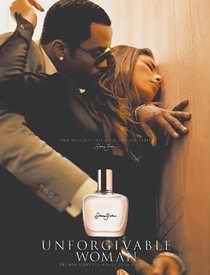 P
Diddy is being censored. The advertisements for his Sean Combs’ fragrance, Unforgivable Woman, are too hot for TV, and are unsuitable even for cable channels! P
Diddy is being censored. The advertisements for his Sean Combs’ fragrance, Unforgivable Woman, are too hot for TV, and are unsuitable even for cable channels!
In the overly long adverts, Diddy is seen “going at it” with Jessica Gomez in a
stairwell and hotel room. But once MTV had screened the offending footage, the big cats at the top sent a list of edits that the Bad Boy will have to make in order for it to be shown again.
Page six reports the offending footage to consists of
Diddy “hiking up” Gomez’s skirt, putting his hand under her dress, and a scene with a another woman holding Gomez’s breast and pulling down her underwear.
Diddy is refusing to edit the commercial.
Update:
Forgiven in Britain 30th September 2007 Several versions of the advert causing hassles in the US have been passed for showing in the UK with
the stipulation that they are shown after the 9pm watershed
|
| 8th September | | |
Censors disagree about film advert
| From the BBC see
full article
|
 A TV trailer for horror film Paradise Lost should not have been aired before 9pm watershed, the
Advertising Standards Authority (ASA) has ruled. A TV trailer for horror film Paradise Lost should not have been aired before 9pm watershed, the
Advertising Standards Authority (ASA) has ruled.
The "gory" advert, featuring blood and surgical instruments, could "cause distress to children," it said.
A viewer complained after watching the 10-second advert on TV
at 20:00.
Distributor Lions Gate had referred the advert to the Broadcast Advertising Clearance Centre (BACC) which said it should not be broadcast before 1930.
A 30-second version of the advert, which was more graphic, had been
restricted until after 2100. Lions Gate argued that this was adequate.
But the ASA disagreed, and upheld the complaint, ruling that the 10-second version should also only be broadcast after the watershed.
n a written judgment, the ASA
said: Although the ad was 10 seconds long only, it showed blood flowing through a tube and an incision being made on the stomach of a woman on an operating table. It showed a man wearing robes and surgical gloves holding a large syringe and dropping a
bloodied rag. The woman said in a distressed tone 'I want to go home'; the inference was that she was being held against her will. We considered this was no less gory or violent than the 30-second ads. We concluded that if scheduled before 9pm those
images could cause distress to children.
The BACC said it had approved the 10-second advert because it felt it was not of such a violent nature that it should receive a post-9pm restriction . The organisation added it had "taken
notice" of the ASA ruling.
|
| 3rd September | |
| Las Vegas allows brothel adverts
| From Las Vegas Now
|
 Advertising in Las Vegas started a new era on Friday. For the first time ever, a legalized brothel bought a moving billboard to drive around Las Vegas. The world famous and historic Chicken Ranch became the first brothel to advertise.
Advertising in Las Vegas started a new era on Friday. For the first time ever, a legalized brothel bought a moving billboard to drive around Las Vegas. The world famous and historic Chicken Ranch became the first brothel to advertise.
Two state
laws had previously banned brothels from advertising anywhere. On July 12, a federal judge overturned those laws, saying they were "overly broad," clearing the way for this.
The Chicken Ranch Brothel in Pahrump paid for the moving
billboard. The Chicken Ranch billboard may actually seem tame for Las Vegas standards. There are no girls anywhere on it -- although it does offer free transportation. Ads pushing Las Vegas shows reveal much more.
A spokesman for the Chicken
Ranch says the brothel wants the advertisements to be done with taste and discretion. Meredith says it hit the mark.
State law allows counties in Nevada to have legal brothels if the population is under 400,000 people. That means prostitution is
not legal in Clark County and Washoe County. The closest brothels to Las Vegas are 60 miles to the west in Pahrump in Nye County.
|
| 26th August | | |
| BarclayCard and National Lottery pull ads from IMDb
| From X Biz see
full article
|
National Lottery and BarclayCard have pulled online ads off of Amazon’s Internet Movie Data Base (IMDB) after finding the banners placed next to listings for adult movie titles.
As company policy, we seek to
advertise only on reputable websites and temporarily removed our adverts from this site while we carried out a full investigation and spoke to the website, a Barclays Group spokesperson said.
The Internet Movie Database seeks to list all
the movies which have ever been made, including adult ones, but by no stretch of the imagination could it be described as a porn site, the Barclays spokesperson said.
Recently, social networking website Facebook had several advertisers,
including Vodafone, pull advertising off the site after the ads were placed next to member profiles that did not meet company standards for appropriate content.
The incidents raise questions about future online advertising campaigns on sites in
which the marketers have very little control over ad placement or advertising on sites that are comprised mostly of user-generated content.
|
| 24th August | |
| Transport for London ban discreet vibrator advert
| From The London Paper
|
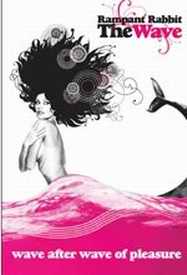 Bosses at high street sex retailer, Ann Summers, are hopping mad
with Transport for London for vetoing the poster for the Rampant Rabbit. Bosses at high street sex retailer, Ann Summers, are hopping mad
with Transport for London for vetoing the poster for the Rampant Rabbit.
The commercial, which has already appeared in a number of magazines and newspapers, had already been cleared by the Advertising Standards Authority.
Inspired by a
famous Japanese tsunami painting it features a floating mermaid and carries the slogan wave after wave of pleasure.
Ann Summers chief executive Jacqueline Gold said: I don’t understand. There is nothing remotely offensive about it. This
is censorship gone mad.
But transport executives reportedly told Ann Summers’ advertisers they would only reconsider their decision if the words Rampant Rabbit were removed from the ad, along with any mention of pleasure.
A TfL
spokesperson said: Consumers purchasing magazines make a conscious choice to read a magazine. Millions of people travel on the London Underground each day and they have no choice but to view whatever ads are posted there. We have to take account of
the full range of travellers and endeavour not to give offence in the adverts we display.”
|
| 23rd August | | |
Find Madeleine McCann cinema adverted cleared by ASA
| From The Guardian
|
 The advertising watchdog has cleared a controversial cinema advertisement about missing toddler Madeleine
McCann after parents complained it was shown before a children's movie. The advertising watchdog has cleared a controversial cinema advertisement about missing toddler Madeleine
McCann after parents complained it was shown before a children's movie.
The Advertising Standards Authority received 23 complaints about the ad, shown in cinemas to appeal for help to in finding the four-year-old, who went missing in Portugal in
May.
After it was screened before U-rated film Shrek the Third , some parents argued it was distressing to children and unsuitable to be shown in conjunction with a family film.
Nine of the complainants said that their
children had been upset by the ad.
Framestore, the company that developed the ad, said the ad had been passed by the BBFC to be aired in U-certificate films. The company also argued the ad had been shown on television and on the internet and no
complaints had been made.
The ASA acknowledged that the idea of a young child disappearing was likely to be inherently upsetting. However, the watchdog considered that it did not contain any distressing images or use sensationalist
language.
It ruled that because the ad highlighted a well-publicised issue in this way it was not unsuitable to be shown before a U-certificate film, was not socially irresponsible and was unlikely to cause undue fear and distress.
From The Scotsman see full article
Meanwhile a radio DJ has unsurprisingly been censured for his comments regarding the disappearance of the four-year-old Madeleine McCann.
TalkSport's Mike Mendoza told listeners the youngster had been snatched by
paedophiles - then linked paedophilia with homosexuality.
Ofcom upheld the complaint, saying: We ... are very concerned that the presenter chose to make such a remark. To connect homosexuality to paedophilia is highly offensive.
|
| 20th August | | |
Nutters whinge at New York billboard
| From Christian Post see
full article
|
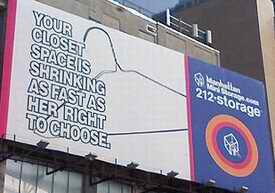 A New York company has angered anti-abortion activists by using the contentious issue to advertise its storage business, by showing a wire coat hanger and the slogan: Your closet space is shrinking as fast as her right
to choose.
A New York company has angered anti-abortion activists by using the contentious issue to advertise its storage business, by showing a wire coat hanger and the slogan: Your closet space is shrinking as fast as her right
to choose.
It's trashy and its vulgar and it's in your face with its crudity, Kiera McCaffrey, of the Catholic League said about the Manhattan Mini Storage billboard.
The Roman Catholic group, a vocal opponent of abortion
rights, has been urging people to complain to the company.
Mary Alice Carr, of NARAL Pro-Choice New York, which advocates abortion rights, said such advertisements reminded people to stay active, even in a city like New York, where the majority
of residents support abortion rights.
|
| 12th August | | |
Intel bow to superior minds
| From The Times
|
 Intel has pulled an advertisement which it acknowledged was 'culturally insensitive
and insulting' Intel has pulled an advertisement which it acknowledged was 'culturally insensitive
and insulting'
The ad, which was for a new generation of micro-processors, showed six black sprinters crouched in the start position in front of a white man wearing a shirt and chinos in an office.
Above the image was a slogan which read:
Multiply computer performance and maximise the power of your employees.
Blogs were quick to spot the connotation of a white master surveying a group of black workers apparently bowed at his feet.
It was intended that the
advertisement convey the performance capabilities of our processors through a number of visual metaphors, Don MacDonald, director of global marketing for the company, wrote: Unfortunately, this ad using African-American sprinters did not
deliver our intended message, and in fact proved to be culturally insensitive and insulting.
Intel said it had pulled the ad from hundreds of publications, but was unable to stop two which had already shipped.
|
| 10th August | | |
| Government to ban advertising for offshore gambling
| The ramifications on the UK internet industry could be far reaching, how will it effect Google, or sites running syndicated
advertising such as Google Adsense. How does one know where companies are based? and how does one define a UK publisher? And worst of all, the Government will surely be tempted to extend advertising bans to all sorts of other
sites. From The Guardian see full article
|
 | Open Up!
We know you have
advertisers inside |
The government has banned about 1,000 off-shore gambling websites, including well-known operators such as William Hill, from advertising in the UK.
The ban applies to any gambling companies operating outside the
European Economic Area, affecting popular websites such as William Hill Casino, Betfred Casino and Poker, Interpoker.com and Littlewoodscasino.com.
From September, when the Gambling Act comes into force, any online firm based in gaming company
havens such as Costa Rica, the Netherlands Antilles and Belize will not be able to market in the UK and the Department of Culture Media will crackdown on illegal advertising.
Because most of the companies have no operations in the UK to legally
pursue, websites, broadcasters and advertising companies that create campaigns for such companies will face fines or imprisonment.
I make no apology for banning adverts for websites operating from places that don't meet our strict standards,
said the culture minister, James Purnell.
Countries that want to be exempted from the ban - which applies to all forms of media including TV, radio, newspapers, magazines, taxis, buses, the tube and websites that publish in the UK - have to
pass a strict test of regulatory standards to then join a "white list".
Alderney and the Isle of Man are the only jurisdictions to have so far made the "white list" after sufficiently demonstrating a rigorous licensing regime
designed to stop children gambling, protect vulnerable people, keep games fair and keep out crime. |
| 10th August | | |
New Zealand cucumber and tomatoes advert banned
| From Stuff see
full article
|
 A New Zealand billboard advertisement picturing two tomatoes at the base of a cucumber next to the
words "thank God for serious steak", has been ruled too offensive. A New Zealand billboard advertisement picturing two tomatoes at the base of a cucumber next to the
words "thank God for serious steak", has been ruled too offensive.
The Advertising Standards Authority (ASA) agreed with a complaint that the billboard picture, on Christchurch's Durham St, had an obvious sexual link.
The
complainant, H Hellewell, said she appreciated clean and humorous billboard advertising, ...BUT... the billboard promoting the MU Steak House and Bar was completely inappropriate and offensive.
The agency that created the ad, Urlwin, McDonald and Clients Ltd, said it was not intended to shock or offend, but to relate to the steak house's target meat eaters in a humorous and effective way.
The majority of the ASA's
complaints board agreed the billboard had not been prepared with a due sense of social responsibility to consumers and society.
A minority of the board believed it did not breach social responsibility standards, but the majority view meant the
complaint was upheld.
|
| 9th August | | |
ASA censors PS3 advert
| From Kokatu
|
 One thing that's not cool to show is a little bald European man sitting in a bathtub, especially when said
European is a mercenary, holding a gun and saying he listens to Giacomo Puccini. One thing that's not cool to show is a little bald European man sitting in a bathtub, especially when said
European is a mercenary, holding a gun and saying he listens to Giacomo Puccini. The Advertising Standards Authority have banned an internet ad featuring Kovac, one of Sony's "This is Living" PS3 ad
campaign characters. The ad reads: You on my side? Listen up, I've killed for less. The music plays Puccini in my head.
This displays over a shot of Kovac pointing a handgun at the bathroom
roof, which the ASA has branded unacceptable: We considered that there was an underlying tone of violence in the ad and we were concerned that the images of Kovac holding the knife and the gun, in conjunction with the text, 'You on my side? Listen up
I've killed for less..." could be seen to glamorise violence or anti-social behaviour.
|
| 1st August | | |
Complaints against ads featuring domestic drama
| From Brand Republic see full article
|
 MFI has amended one of
its controversial new adverts following complaints to the Advertising Standards Authority. MFI has amended one of
its controversial new adverts following complaints to the Advertising Standards Authority.
The company has taken the ad featuring a mother who accosts her teenage daughter for being out late, and put it in Spanish with subtitles. It opens with a
board saying the furniture retailer has amended it because it was not to everyone's tastes.
The ads have now attracted more than 191 complaints from viewers who have taken offence at the overriding aggressive tone of the ads, and the ASA says
formal investigations are under way. The complainants have voiced concerns that the ads set a bad example, encourage antisocial behaviour and glorify a 'bullying and disrespectful attitude'.
The ads show families acting out 'typical' at-home
situations in MFI stores. Families and couples are seen arguing among themselves, and in one ad, a mother accosts her teenage daughter for being out late, demanding to know whether she has been drinking. The daughter shouts back and storms out of the
room, pushing into an MFI sales adviser.
|
| 30th July | | |
Madonna fashion adverts cleared by ASA
| Based on an article from ASA
|
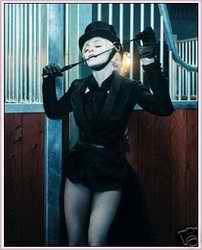 A
TV ad, for clothes designed by Madonna, showed a young woman being led up to Madonna, who was sitting at the head of a conference table, surrounded by fashionably dressed women. Madonna said How can I help you? . A
TV ad, for clothes designed by Madonna, showed a young woman being led up to Madonna, who was sitting at the head of a conference table, surrounded by fashionably dressed women. Madonna said How can I help you? .
One of the young woman's socks rolled down her leg and she pushed the other one down to match. Madonna said I like it. The shot cut to her striking a whiteboard, which had the word FASHION projected on it, with a
riding crop saying "IT, IT, IT, IT, IT". She then slammed the crop onto the table and asked What is it? . The young woman hesitated and said, Well I think it ... Madonna replied, Don't think it, you need to know it.
The young woman was escorted into a dressing room by two men, who undressed and redressed her in more fashionable clothes while Madonna repeated Doesn't have it. Doesn't have it. Doesn't have it. The young woman then returned to the boardroom
wearing the same outfit as Madonna, who said You made it . A designer rushed over and threw himself at Madonna's feet and cried No, no, no, no, no, you made it. Madonna and the young woman then strode away together and Madonna said And I
love it.
The ad was given an ex-kids restriction by the Broadcast Advertising Clearance Centre (BACC).
Issue
1. 18 viewers complained that the ad was offensive, because they believed it depicted a young girl being stripped by
force by two men and under threat of physical punishment.
2. Seven viewers challenged whether the ad was harmful, because they believed the depiction of the young girl would appeal to, and encourage, paedophiles.
ASA Assessment
1. Not upheld:
Although the ASA acknowledged that some people had found the ad disturbing, we considered that the quick change of clothes undergone by the interviewee was likely to be seen as a
reference to catwalk fashion and the riding crop as a symbol of Madonnas perceived artistic style, not a threat of physical punishment. Because of that, we considered that the ex-kids restriction for the ad was sufficient to avoid frightening young
children and concluded that the ad was unlikely to cause serious or widespread offence, or be seen to encourage or condone violence or cruelty.
2. Not upheld:
We noted the actress who portrayed the role of the interviewee was 24 years old and
considered that most viewers would not infer from her style of clothing that she was a school girl. We also considered that it was clear, from the ad, that she was applying for a job within Madonnas fashion company and therefore likely to be past school
age. We further considered that the quick change of clothes was likely to be seen to contain a sense of urgency, rather than being sexually suggestive or titillating. Because of that, we concluded the ad did not portray a child in a sexually provocative
manner or contain material that could harm children by encouraging paedophiles.
|
| 11th July | | |
New York church gets arsey about billboards
| From Actress Archives
|
 A poster for a bidet company was to be put up in Broadway's theater
district on a building that houses a church. The billboard featured bare buttocks, but has been temporarily banned by a judge in New York City. State Supreme Court Justice Mary Friedman ordered the temporary restraining order against the bidet company
billboard yesterday after hearing the complaints of Reverend Neil Rhodes, the pastor of the interdenominational Times Square Church. Bidets, buttocks, and religion don't mix in Times Square. A poster for a bidet company was to be put up in Broadway's theater
district on a building that houses a church. The billboard featured bare buttocks, but has been temporarily banned by a judge in New York City. State Supreme Court Justice Mary Friedman ordered the temporary restraining order against the bidet company
billboard yesterday after hearing the complaints of Reverend Neil Rhodes, the pastor of the interdenominational Times Square Church. Bidets, buttocks, and religion don't mix in Times Square.
The billboard ads were for the Washlet, a bidet-toilet
seat that uses warm water and air to clean the buttocks. The ads featured naked buttocks with smiley faces. Sounds quaint.
To get the billboards banned, Reverend Rhodes had to pay a $90,000 bond pending a decision on the issues at a conference
between the parties. The bond will go to the bidet company for damages and costs, including lost revenue, if the restraining order is overturned and the court rules that the church wasn't entitled to an injunction.
|
| 6th July | | |
ASA investigate asterisked Barnardo's advert
| From The Guardian see
full article
|
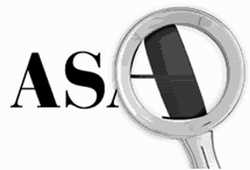 The advertising watchdog has launched an investigation into a campaign by
children's charity Barnardo's, featuring a boy who tells parents and social workers to "F**k off", after complaints that it is offensive and in poor taste. The advertising watchdog has launched an investigation into a campaign by
children's charity Barnardo's, featuring a boy who tells parents and social workers to "F**k off", after complaints that it is offensive and in poor taste.
The Barnardo's campaign, labelled Believe in Children, launched last week across
newspapers, radio, posters and online.
The Advertising Standards Authority is launching an investigation into one of the ads, the "F**k off story", which could set a precedent on how the swear word can be used in newspaper ads.
The ad, created by agency Bartle Bogle Hegarty, features a picture of a child. Text running alongside says:
He told his parents to f**k off. He told fourteen social workers to f**k off. He told us to f**k off. But we didn't. And we still haven't.
Another version of the ad, which ran in national newspapers, removes the "k" leaving the
offensive word written as "f***".
The ASA has so far only received two complaints on the basis that the use of the word is offensive and in poor taste. However, because the Barnardo's ad features such an offensive word the ASA decided
the campaign requires investigation by its council.
|
| 3rd July | | |
Advertising their lack of a sense of humour
| From The Sun
From Goole Times
|
 A couple have been ordered to remove their cheeky car wash firm slogan that promised: “The
best hand-job in town.” A couple have been ordered to remove their cheeky car wash firm slogan that promised: “The
best hand-job in town.”
The sign on the side of a lorry also showed a bikini-clad blonde soaping down a pink Cadillac. But councillors in Goole, East Yorks, branded it inappropriate and Soapy Rides owners Nigel and Michaela Kennings were fined
£400 with £600 costs by magistrates.
Michaela said: It’s absolutely ridiculous. The sign has caused great amusement to customers. We are surrounded by old warehouses and this brightened up the area.
A retrospective
planning application submitted by Soapy Rides to keep the advertising sign in place was refused by East Riding of Yorkshire Council in October last year.
Nigel Kenning said of the council: They claim that the sign is discordant and intrusive,
has dominant visual impact and detracts from the character and amenity of the locality. I don't know who they think they are kidding.
A spokesperson for the council said in February: ERYC contacted the owners of the unauthorised hoarding,
requesting it be removed a number of times. Unfortunately, the sign remains. This has left the council with no alternative but to refer the matter to the courts, as placing an advertisement without the consent required for it is an offence.
|
| 29th June | | |
Run it up the lap dancing pole and see how it flies
| From ic Surrey
|
 A marketing company has admitted it lied to the public after it was
discovered that a massive advert of a naked stripper wrapped around a pole across in a paddock does not exist. A marketing company has admitted it lied to the public after it was
discovered that a massive advert of a naked stripper wrapped around a pole across in a paddock does not exist.
In what is thought to be the biggest hoax to hit the area, the Horley Mirror can confirm that the so-called advert is nothing more then
a marketing stunt which cost less than £100 to produce.
The doctored image of what appeared to be a 100,000 square foot advert for an online lap dancing club was the creation of Flightpath Media, a London-based advertising agency, using the
computer design program Photoshop.
The farcical stunt tricked a number of regional newspapers, including the Mirror, gained national media attention in newspapers such as The Sun and The Times, and was even reported by international media outlets
based as far afield as Australia.
Tandridge District Council has spent the past three weeks searching for the advert in the Burstow area at the expense of taxpayers.
Flightpath Media told the Mirror the advert was placed in the paddock
and took eight people three days to paint.
Flightpath Media owner, Stephen Pearson, claims the hoax generated "several million of pounds" and a number of subscriptions for the online lapdancing club.
An unrepentant Mr Pearson
now believes his company will win an award for the best marketing campaign "in the last few years". He said: It's all a marketing stunt that has worked perfectly.
|
| 28th June | | |
PlayStation game advert banned
| From the Bit-Tech see
full article
|
 An advert for the upcoming PlayStation 2 game, Burnout:
Dominator from EA, has been labelled as 'irresponsible' by the UKAdvertising Standards Authority. An advert for the upcoming PlayStation 2 game, Burnout:
Dominator from EA, has been labelled as 'irresponsible' by the UKAdvertising Standards Authority.
The advert was the subject of 37 complaints and features a crashed car under the slogan Inner peace through outer violence .
An ASA spokesperson said: The complainants described the advert as offensive as it condoned and was likely to encourage violence, dangerous driving and anti-social behaviour such as vandalism... The Advertising
Standards Authority determined that the implication of the advertisement was likely to cause serious or widespread offence.
|
| 21st June | | |
Censors gorge themselves on pedantry
| From the BBC see
full article
|
 Reruns of a TV commercial from the 1950s which urged viewers to "go to work on an egg"
have been banned. Reruns of a TV commercial from the 1950s which urged viewers to "go to work on an egg"
have been banned.
An advertising watchdog said the slogan went against the principle of eating a varied diet.
The Egg Information Service had wanted to screen the advert, which featured comedian Tony Hancock, to celebrate its 50th
birthday.
Author Fay Weldon, who headed the team which came up with the slogan, has described the decision as absurd.
The Broadcast Advertising Clearance Centre (BACC) defended its decision, insisting that the adverts did not suggest a
varied diet.
BACC spokesman Kristoffer Hammer said: Dietary considerations have been at the centre of the new rules for advertising and in consideration of this we felt that these adverts did not suggest a varied diet. The concept of
eating eggs every day for breakfast goes against what is now the generally accepted advice of a varied diet and we therefore could not approve the ads for broadcast.
British Egg Information Service spokesperson Amanda Cryer said: We have
been shocked by this ruling as eggs are a healthy, natural food which are recommended by nutritionists.
What's more, there are no restrictions on the number of eggs people can eat, which was recently confirmed by the Food Standards Agency, and
between five and seven eggs a week would be totally acceptable for most people.
In addition, many other advertisers clearly promote their products to be eaten every day such as breakfast cereals so we are very surprised that eggs have been
singled out in this way. Comment: Eggstreme Censorship From Shaun Unelected
advertising censor, bans a new version of the TV advert I've never known anything so daft. I've emailed 'em to tell 'em so too. Interestingly "Go to work on an egg" was coined by Fay Weldon,
who was on the panel at the BBFC appeal which finally made hard core videos legal. She was one who voted in favour. Now she has a famous phrase of her own censored. I wonder what she thinks about that?
|
| 19th June | | |
Council objects to aerial advertising
| Based on an article from The Sydney Morning Herald see
full article
|
 A giant silhouette of a pole dancer painted on a
field beneath Gatwick Airport's flight path is said to be disturbing the British countryside. A giant silhouette of a pole dancer painted on a
field beneath Gatwick Airport's flight path is said to be disturbing the British countryside.
The 9,300 square metre advertisement is nearly invisible from the ground, but can be seen by airline passengers.
Tandridge District Council spokeswoman Giuseppina Valenza said that the ad was painted on the field without proper permission and that the council would take legal action if it was not removed.
Stephen Pearson of
Sports Media Gaming Ltd, the company behind the ad, said the council had no grounds for removing it: I think they're unsure about their own regulations to be honest. We're not going to remove it at all.
The advert is for a pay per view/subscription website featuring pictures and videos of pole dancers.
|
| 24th May | | |
Spanish airline advert pulled
| From International Herald Tribune
|
 The Spanish airline Iberia has withdrawn a cartoon ad that depicts a baby boy
frolicking on a beach with buxom black Cuban ladies after consumer groups complained it is insulting to women and encourages sexual tourism. The Spanish airline Iberia has withdrawn a cartoon ad that depicts a baby boy
frolicking on a beach with buxom black Cuban ladies after consumer groups complained it is insulting to women and encourages sexual tourism.
The pair of women — with exaggerated lips and tiny, tight shorts on broad hips — massage and pamper the
white Spanish infant after he arrives in Havana on a free trip from Iberia. At one point, lounging at a seaside bar, he sings: Come on honey, take me to the crib.
Iberia's web site ran the video as part of a contest offering free trips to
celebrate the site's 10th anniversary. The clip was yanked last week after less than 10 days on the page, following a complaint by the Federation of Consumers in Action.
Ileana Fuentes, executive director of the Miami-based Cuban Feminist
Network, said the cartoon plays to the idea that for Spanish men, Cuba is the place to go for easy sex with poor, black women.
|
| 16th May | |
| ASA rule on fishhook advert
| From the Daily Mail
|
 A
health campaign which showed smokers being snatched by fish hooks in their mouths has been criticised for frightening children. A
health campaign which showed smokers being snatched by fish hooks in their mouths has been criticised for frightening children.
The Advertising Standards Authority received 744 complaints about the Department of Health TV commercials and posters.
The campaign attracted the highest number of complaints to the Advertising Standards Authority for two years. The ASA criticised the handling of the Government-health initiative. They said most of those who complained considered the images were
"offensive, frightening and distressing", particularly to children.
It ruled that the commercials cannot be shown during children or family viewing times. It seems the posters will be banned outright.
The Department of Health
said the adverts were designed to confront smokers with the controlling nature of their addiction and were not meant merely to attract attention or to be gratuitous.
|
| 10th May | | |
And the adverts that they whinged about
| | |
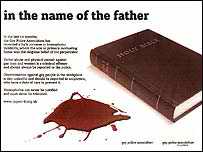 Based on an article from the BBC see
full article Based on an article from the BBC see
full article Top 10 adverts of 2006 by volume of complaints.
- Gay Police Association ad, 533 complaints
Featuring a claim from the Gay Police Association of a link between homophobic attacks and religious motivation. Several Christian groups complained saying it was
offensive to them and discriminatory in tone.
- Revenue and Customs ad, 271 complaints
The advert offended many self-employed people, and plumbers in particular, who said the advert made
them look like tax evaders.
- Dolce & Gabbana 166 complaints
A new concern from 2006 was the glamorisation of knives.
- Motorola
ad, 160 complaints
Another appearance for D&G whose joint advert with Motorola, complainants said, "condoned knife-related violence" and "glamorised sexual violence".
-
Carphone Warehouse ad, 145 complaints
The familiar Carphone Warehouse adverts riled customers and competitors, particularly claims that its service would be "free forever".
-
French Connection ad, 127 complaints
A TV advert in which two women had a martial-arts contest, culminating in a kiss.
- Channel 5 ad, 99 complaints
Five ran a teaser poster campaign saying that "nothing good ever came out of America". Some people complained that the teaser was racist towards Americans and socially irresponsible in that it could incite racial violence.
- Kellogg's ad, 96 complaints
Objections to a Kellogg's television ad featuring a man riding a dog claimed that it portrayed cruelty to animals and would encourage viewers to try the same
stunt at home.
- National Federation of Cypriots ad, 93 complaints
An advert drew complaints from a human rights organisation which was concerned it was offensive to the Turkish community
and likely to incite racial hatred.
- Dolce & Gabbana, 89 complaints
D&G and the politics of same-sex relations appeared three times each in the top 10. D&G's TV ad showed a
brief kiss between two men, and was followed by complaints that it was unsuitable for children to see, and some that it was unsuitable to show at any time.
|
| 15th April | | |
Drinks censors and their ban of Rubbel Sexy Lager
| | |
 Thanks to Alan who points out more from The Portman Groups press release on the ban: Thanks to Alan who points out more from The Portman Groups press release on the ban:
David Poley, Chief Executive of The Portman Group, said: Some people might think this is harmless fun but there is a serious issue involved. Drinking excessively can affect people’s judgement and behaviour leading to
them engaging in sexual activity which they later regret. [Sounds like he is referring to beer goggles] Our Code disallows drinks marketing being linked to sexual success. The
industry has set itself strict marketing rules and this drink has fallen short of those high standards. All complaints are heard by an Independent Complaints Panel which is Chaired by Sir Richard Tilt,
former Director General of the Prison Service. The Panel looks at each case on its merits and decides whether the complaint should be upheld. A single complaint from a member of the public, or any interested party, is enough to trigger
an investigation. The other members of the Panel are Morven Proctor, Callum Jacobs, Angela Sarkis CBE, Nigel Long, Jon Eggleton, Revd. Canon Professor Martyn Percy and Barbara O'Donnell.
And as Alan says,
Interesting to see the make-up of the allegedly "independent" group who adjudicate, including such establishment figures as a knight (and former chief jailer!) a CBE and a canon. Who do these prats think they are? Sergio wryly makes an observation about the great and the good:
Being in a position of power can also affect people’s judgement and behaviour leading to them engaging in sexual activity which they later regret.
|
| 14th April | | |
Drinks censors ban Rubbel Sexy Lager
| Based on an article from Morning Advertiser
|  Bottles of a Belgian lager displaying a picture of a woman whose clothing can be removed have been stripped from shelves for breaching The Portman Group’s rules.
Bottles of a Belgian lager displaying a picture of a woman whose clothing can be removed have been stripped from shelves for breaching The Portman Group’s rules.
Labels of Rubbel Sexy Lager show the young
lady wearing a swimsuit that can be scratched off to reveal her naked.
Buckinghamshire Trading SubStandards complained to the drinks watchdog which ruled the name of the drink and the swimsuit feature were associated with sexual success.
This is banned under The Portman Group’s Code of Practice on the Naming, Packaging and Promotion of Alcoholic Drinks. The drinks have been withdrawn from sale following the complaint decision.
David Poley, chief executive of The Portman Group, spouted politically correct bollox: Some people might think this is harmless fun but there is a serious issue involved.
Drinking excessively can affect people’s judgement and behaviour
leading to them engaging in sexual activity which they later regret.
|
| 7th April | |
| Over fishhook anti smoking adverts
| From The Times
|
 The Department of Health is to be reprimanded formally by the Advertising
Standards Authority over its £7 million anti-smoking advertising campaign, which depicted smokers with giant fishhooks piercing their mouths. The Department of Health is to be reprimanded formally by the Advertising
Standards Authority over its £7 million anti-smoking advertising campaign, which depicted smokers with giant fishhooks piercing their mouths.
According to a confidential document seen by The Times, the campaign breached strict codes
designed to protect children from disturbing images.
It attracted 771 complaints, most of them from parents who described the advertisements as offensive, frightening and distressing to children.
One television advert, screened before the
9pm watershed, showed an office worker with a giant fishhook through his cheek being dragged from his desk to a smoking spot in a freezing car park. Another showed a hook pulling a mother away from her small daughter. A third depicted a man being dragged
through traffic and into a newsagent’s shop to buy cigarettes.
Billboard adverts showed the contorted faces of smokers being pierced by giant hooks.
Arpan Boyall, an investigations executive for the Advertising Standards Authority, is to
recommend that the adverts breached strict codes that are designed to protect children and that therefore the authority should uphold the complaints against the posters and television adverts and reprimand the Department of Health.
In a
confidential report, Boyall wrote: We noted the posters showed the hooks clearly piercing the cheeks of the addicted smokers who, we considered, looked distressed and in pain. We noted that, although the posters had not been placed near schools, they
had appeared in places where they could easily be seen by children. We considered that, although the posters highlighted the perils of tobacco addiction and discouraged the dangerous activity of smoking, because they were untargeted and realistically and
graphically showed the piercing of the cheek with a hook, they were likely to frighten and distress children.
|
| 4th April | | |
| ASA ban Xbox 360 advert
| From The Telegraph see
full article
|
 A TV commercial for the Xbox 360 games console broke advertising rules by
glamorising street car racing, according to the Advertising Standards Authority (ASA) A TV commercial for the Xbox 360 games console broke advertising rules by
glamorising street car racing, according to the Advertising Standards Authority (ASA)
It showed a car weaving through traffic during a chase scene in a busy city. The Advertising Standards Authority said the commercial broke rules relating to
health and safety and driving standards and ordered it not to be shown again: We concluded that the ad glamorised street car racing and could be seen to condone dangerous driving,
Responding to the ASA's investigation on behalf of
Microsoft, which makes the Xbox 360, advertising agency McCann Erickson said the advert didn't show cars exceeding speed limits and the on-screen text explained all stunts were performed by professionals.
|
| 14th March | | |
Dolce and Gabbana pull all advertising in Spain
| From eitb24
|
 Dolce & Gabbana
will pull all advertising from Spain to "protect their creative liberty", the Italian designers said after authorities there called for a ban on their latest campaign for humiliating women. Dolce & Gabbana
will pull all advertising from Spain to "protect their creative liberty", the Italian designers said after authorities there called for a ban on their latest campaign for humiliating women.
Spain, with its climate of censure, shows
that it wants to read negative messages even where they don't exist, the designers said in a statement.
One advert, which Dolce & Gabbana have also withdrawn in Italy, shows a bare-chested man holding down a woman by her wrists while
other men look casually on. It garnered criticism from human rights group Amnesty International and a union in Italy.
Dolce & Gabbana said they would organise "alternative initiatives" for promotions in Spain. [controversial news coverage perhaps?]
|
| 2nd March | | |
Dolce and Gabbana advert offends in Spain
| From The Independent
|
 Dolce & Gabbana
are wowing the fashion world on the catwalks of Milan, but feminists in Spain have condemned their latest advertising campaign as sexist and violent, throwing the flamboyant duo into a hissy fit and prompting withdrawal of the images. Dolce & Gabbana
are wowing the fashion world on the catwalks of Milan, but feminists in Spain have condemned their latest advertising campaign as sexist and violent, throwing the flamboyant duo into a hissy fit and prompting withdrawal of the images.
The ads,
which appeared in Spain, show a half-naked man holding a scantily clad woman to the ground by her wrists while four predatory hunks look on. Spain's Women's Institute, a government organisation linked to the Labour Ministry, described the scene as
offensive to women's dignity and an incitement to sexual violence.
Domenico Dolce and Stefano Gabbana announced they would drop their campaign in Spain and covered their retreat with acid-drenched sneers. We will withdraw that photo from the
Spanish market alone, since they are behind the times. What does an artistic photo have to do with the real world? If Spanish views held sway, you'd have to burn museums like the Louvre and all the paintings of Caravaggio , they added.
But Spanish women objected not to the supposed sensuality or eroticism but the image's glorification of sexual violence. The advert suggests it is acceptable to use force as a way of imposing oneself on a woman, reinforced by the passive complicity of
the men looking on, the Labour Ministry said.
Last month, a D&G campaign featuring bloodstained models brandishing knives was banned in Britain after the Advertising Standards Authority received scores of complaints that the pictures
glorified violence. The ads appeared in newspapers alongside stories about mounting British gun crime.
|
| 16th February | | |
Nutters complain about Times Online advert
| Based on an article from The Guardian
|
 An ad for the new Times Online website featuring a woman in a bra with money stuffed into her cleavage could be investigated by the advertising watchdog after a member of the public complained. The ad is accompanied by a
quote from Top Gear presenter and Sunday Times columnist Jeremy Clarkson: Money and rumpy-pumpy are the twin engines powering everything we do. The twin engines allude to "news plus views".
An ad for the new Times Online website featuring a woman in a bra with money stuffed into her cleavage could be investigated by the advertising watchdog after a member of the public complained. The ad is accompanied by a
quote from Top Gear presenter and Sunday Times columnist Jeremy Clarkson: Money and rumpy-pumpy are the twin engines powering everything we do. The twin engines allude to "news plus views".
The nutter said the poster ad, which is
part of a campaign to promote last week's launch of the new-look Times Online, was irresponsible and should not be shown where it can be seen by children.
The Advertising Standards Authority is considering whether to launch an investigation into
the campaign, on the grounds that it could be in breach of the advertising code for taste and decenc
|
| 11th February | | |
Advert featuring accidental male kiss withdrawn
| From Christian Today see
full article
|
 A Snickers commercial that aired during the
Super Bowl and featured two car mechanics accidentally kissing has been immediately withdrawn following complaints from several gay rights organisations that labelled it as “homophobic.” A Snickers commercial that aired during the
Super Bowl and featured two car mechanics accidentally kissing has been immediately withdrawn following complaints from several gay rights organisations that labelled it as “homophobic.”
Mars Inc. also erased all related content on their website
in response to the criticism. The company apologised for the infraction in a public statement, saying the commercial was intended to be funny, not offensive.
In the commercial, two auto mechanics are seen to be biting into a Snickers bar, each
from either end. As a result, the two unintentionally kiss each other and become instantly uncomfortable.
Pro-homosexual organisations took offence to the commercial when later the two men begin tearing hair from their own chests so they could
appear more “manly.” The characters’ reactions were viewed as demeaning.
The Snickers website also featured alternate endings to the commercial which viewers could vote on. One depicts a man grabbing a wrench to strike his coworker, who then
responds by placing the other man’s head under the hood and slamming it shut.
I don't know what kind of mind-set it takes to think it's okay to slug another guy because of a mistaken kiss, said Neil G.
Giuliano, president of Gay and Lesbian Alliance Against Defamation: It's just unacceptable.
|
| 1st February | | |
| ASA dismiss prawn brain complaints
| Based on an article from ASA
Spotted by
MediawatchWatch
|
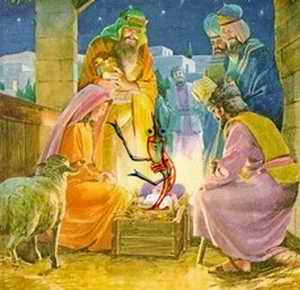 | A King is Born!
(mock up) |
An ad in The Grocer magazine, for The Big Prawn Company, featured an image of a framed painting depicting the nativity. A king prawn was shown in the manger in place of the baby Jesus. Text underneath the picture stated
A KING IS BORN' ORDER NOW TO ENSURE A CHRISTMAS DELIVERY THE BIG PRAWN CO . The Big Prawn Company launches its new King prawn in December. Nutters from Food Chain Solutions and the public thought
the image of the nativity scene with a prawn in the place of the baby Jesus was offensive, especially to Christians.
The Big Prawn Company said they had not intended their ad to offend and had believed that most readers would understand that the
approach was meant to be light-hearted. They did not believe the ad was disrespectful or mocking of religion and explained that they had a running theme of using puns involving prawns to advertise their company and did not believe that the ad would cause
serious or widespread offence. The Big Prawn Co. said they printed an apology in the subsequent issue of The Grocer and said that they would not use the ad again. The Big Prawn Company received 16 complaints.
The Grocer said they had given
serious consideration to the ad before running it. They thought the ad was intended to be humorous, rather than offensive, and because The Grocer was a specialist title, with a diverse readership encompassing all faiths, they concluded that it was
unlikely to cause serious or widespread offence. They Grocer said that they had received 28 complaints about the ad.
The ASA acknowledged that the Big Prawn Co. had issued an apology to those who complained to them about the ad and that they had
also published an apology in The Grocer. We noted they had no plans to use the ad again.
While we noted some readers had been offended by the depiction of a prawn in place of the baby Jesus, we considered that the approach would be seen as
light-hearted by most readers of The Grocer; it was unlikely to cause serious or widespread offence. The ASA did not find the advert in breach and no further action is necessary. |
|
|